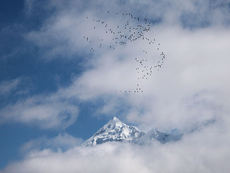SILENT ILLUMINATION By Hung Chih Cheng-Chueh (1091-1157)
Silently and serenely, one forgets all words,
Clearly and vividly, it appears before you.
When one realizes it, time has no limits.
When experienced, your surroundings come to life.
Singularly illuminating is this bright awareness,
Full of wonder is the pure illumination.
The moon's appearance, a river of stars,
Snow-clad pines, clouds hovering on mountain peaks.
In darkness, they glow with brightness.
In shadows, they shine with a splendid light.
Like the dreaming of a crane flying in empty space,
Like the clear, still water of an autumn pool,
Endless eons dissolve into nothingness,
Each indistinguishable from the other.
In this illumination all striving is forgotten.
Where does this wonder exist?
Brightness and clarity dispel confusion
On the path of Silent Illumination,
The origin of the infinitesimal.
To penetrate the extremely small,
There is the gold shuttle on a loom of jade.
Subject and object influence each other.
Light and darkness are mutually dependent.
There is neither mind nor world to rely on,
Yet do the two interact, mutually.
Drink the medicine of correct views.
Beat the poison-smeared drum.
When silence and illumination are complete
Killing and bringing to life are choices I make.
At last, through the door, one emerges.
I came across the above text during one of my sits with the local Western Chan Fellowship group who meet once a month in Leusdon village hall in the midst of Dartmoor. I’ve always thought this simple hall would make a superb zendo. It’s isolated, with magnificent views over the moors and a calm settled atmosphere. I felt inspired by the poem and particularly by these lines
‘Like the dreaming of a crane flying in empty space,
Like the clear, still water of an autumn pool, ‘
These have stayed with me and supported me throughout my practice both on the cushion and off.
The author of the poem Tiantong Zhengjue (1091–1157), was a Chinese Chan Buddhist monk who authored or compiled several influential Buddhist texts. His conception of silent illumination is of particular importance to the Chinese Caodong Chan and Japanese SÅtÅ Zen schools;
A couple of generations later Tiantong Ruijing (1163 to 1238) was another Caodong Buddhist monk living and teaching at the same temple on TiÄntóng Mountain He famously taught and gave dharma transmission to our SÅtÅ Zen founder Eihei DÅgen.
It is said that when Ruijing became a leader, he didn't put himself above the other monks. He wore the black surplice and robe of a monk. He was given a purple vestment of honour by the emperor of China, but he declined it. Even after reaching enlightenment, he was willing to clean the bathroom. He is traditionally the originator of the terms shikantaza,” just sitting” and shinjin-datsuraku ("casting off of body and mind").
I have often wondered when reading Dogen what the source of his poetic genius was. It must have partly been innate of course however when reading the biographies of these two remarkable Zen masters the answers began to fall into place. To read ‘Silent Illumination,’ is to be aware that Tiantong Zhengjue was an extraordinary poet quite apart from all his other gifts.
Further when we study the life of Tiantong Ruijing who was the teacher who answered the question that had sent the young Dogen to Japan we realise that here is another poetic genius. ‘The Record of Ruijing,’ reveals Dogen’s teacher to be among the most expressive of the ancient zen masters and his dharma talks were effused with natural allusions and poetry of a very high order.
One day entering the dharma hall Rujing addressed the monks;
“This morning is the first day of spring. The poetry of the pomegranate blossoms enters its Samadhi. How can such words be expressed?”
“The willows are adorned with waistbands and plum blossoms fall onto your sleeves. You catch a glimpse of the orioles. Dance like the great wind!”
“The clouds mindlessly drift past the mountain cliffs. Four years ago or just yesterday, is today. In due course water returns to its source. Four years hence, or just today, is yesterday.”
Was it these two teachers Tiantong Zhengjue and Tiantong Ruijing who both taught at Tiantong monastery separated by a generation or so who awoke that latent ability in Dogen to express himself such a poetically powerful way?
It’s my guess that Eihei Dogen went to Tiantong Mountain monastery a fledging poet and came back to Japan a great one.
Written in 1233 five years after his return ‘Genjo Koan,’ written for a lay student offers a fine example of Dogen’s authority and power as a poet;
“Enlightenment is like the moon reflected in the water. The moon does get wet, nor is the water broken. Although its light is wide and great, the moon is reflected even in a puddle and inch wide. The whole moon and the entire sky are relected in dewdrops on the grass, or even in one drop of water.
Enlightenment does not divide you, just as the moon does not break the water. You cannot hinder enlightenment, just as a drop of water does not hinder the moon in the sky. The depth of the drop is the height of the moon. Each reflection however long or short its duration, manifests the vastness of the dewdrop and realises the limitlessness of the moonlight in the sky.”
My thanks to Andy Fergusons’ masterful book, ‘Zen’s Chinese Heritage.’
To Wikkipedia and to Western Chan Fellowship for drawing my attention to Silent Illumination.
Back to front page
